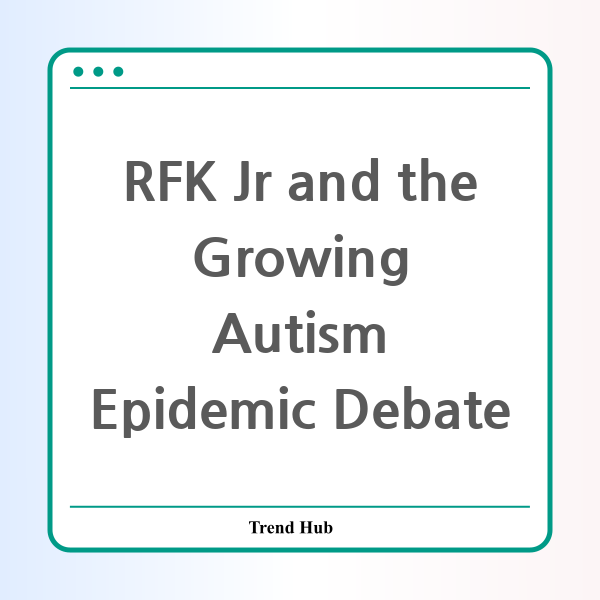* This website participates in the Amazon Affiliate Program and earns from qualifying purchases.

As Autism rates in the United States continue to climb, prominent figures like Robert F. Kennedy Jr. are making headlines with their controversial remarks. Kennedy recently declared autism a growing "epidemic", attributing the rise to environmental toxins instead of broadening the discussion to include its multifaceted origins, including genetic factors and increased awareness.
This focus on environmental causes has sparked a significant backlash from experts within the autism community, who emphasize that autism is a complex condition influenced by a variety of elements. With the CDC reporting an increase from 1 in 36 children diagnosed in 2020 to 1 in 31 in 2022, many are questioning whether the label of a "crisis-level epidemic" is genuinely reflective of the changing landscape or simply a misunderstanding of the data.
Autism advocacy groups argue that framing autism as an epidemic is not only misleading but also stigmatizing to autistic individuals and their families. Rather than viewing these rising statistics purely as a crisis, it is critical to recognize the broader context in which they sit. Improved diagnostic tools and awareness have allowed for more children to receive appropriate diagnoses, especially among previously underserved communities.
One of the more troubling aspects of Kennedy's rhetoric is his insistence on viewing autism solely through a lens of tragedy, a narrative that many in the autistic community find harmful. Kennedy's statements, such as that autism "destroys families", only reinforce outdated stereotypes that depict autistic individuals as burdens rather than unique individuals capable of contributing to society in meaningful ways. Such views are not only detrimental but can have serious implications for public perception and policy surrounding autism.
Data revealed by the CDC indicates that the increasing rates of autism diagnoses might stem from better access to early identification services, which is crucial for effective early intervention and support. This, however, is often overshadowed by claims that sensationalize the issue, leading to a skewed understanding of autism's actual impacts.
Moreover, Kennedy's call for immediate identification of environmental toxins as causative factors in autism overlooks the substantial body of research that attributes the condition to genetic predispositions alongside environmental influences. While it is essential to continue investigating potential environmental risks, the simplistic attribution of autism to toxins alone is both scientifically unfounded and dismissive of the lived experiences of autistic individuals.
As we navigate the complexities surrounding the conversation about autism, it is essential to acknowledge the diversity within the autistic community and the valuable perspectives that those who experience autism firsthand can provide. Instead of labeling individuals with autism as victims or families in crisis, we should aim to promote understanding, acceptance, and inclusion.
In conclusion, while the rising rates of autism deserve attention, it is vital that the discourse surrounding it evolves to reflect the nuanced realities of those it affects. Emphasizing a multi-faceted approach to understanding autism is not just beneficial; it is necessary for fostering an environment where autistic individuals can thrive.
* This website participates in the Amazon Affiliate Program and earns from qualifying purchases.